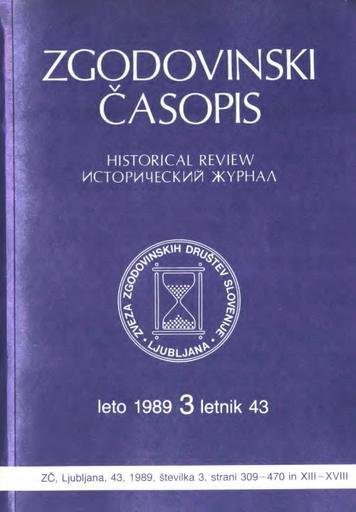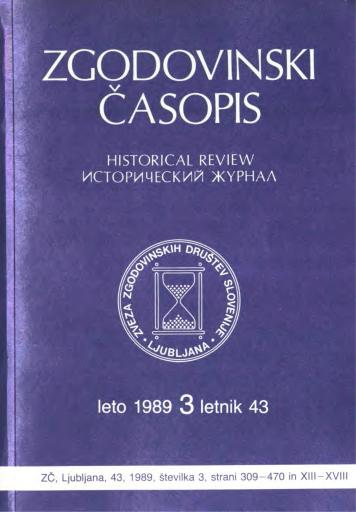
/
Periodicals
/
Zgodovinski časopis
Social Changes in the Croat-Slavonic Vojna krajina (Border-Land) after Cessation of Financing from the lnner-Austrian States

Author(s):Karl Kaser
Co-author(s):Vasilij Melik (odg. ur.)
Leto:1989
Publisher(s):Zveza zgodovinskih društev Slovenije, Ljubljana
Source(s):Zgodovinski časopis, 1989, št. 3
Language(s):slovenščina
Type(s) of material:text
Files (1)

Name:ZGODOVINSKI_CASOPIS_LETO_1989_LETNIK_43_STEVILKA_3.pdf
Size:9.41MB
Format:application/pdf
Permanent link:https://hdl.handle.net/11686/file132
Description
In the middle of the 18th century the organization and financing of the Croat-Slavonic Vojna krajina was from the Inner-Austrian States taken over by the Vienna Central Offices. A number of long-term structural changes of social circumstances in Vojna krajina followed: militarisation and bureaucratisation of the Vojna krajina society, introduction of regular census and conscription lists, integration of civil territories into Vojna krajina, interdiction of partitlon of families and decreeted reviving of co-operative societies, uniforming the population etc. The population preserved the independant peasant status, the new self-financing saved the state many expenses.
Metadata (11)
- identifierhttps://hdl.handle.net/11686/14042
- title
- Družbene spremembe v hrvaško-slavonski Vojni krajini po koncu financiranja s strani notranjeavstrijskih stanov
- Social Changes in the Croat-Slavonic Vojna krajina (Border-Land) after Cessation of Financing from the lnner-Austrian States
- creator
- Karl Kaser
- contributor
- Vasilij Melik (odg. ur.)
- subject
- Vojna krajina
- hrvaška zgodovina
- financiranje
- notranjeavstrijski stanovi
- description
- In the middle of the 18th century the organization and financing of the Croat-Slavonic Vojna krajina was from the Inner-Austrian States taken over by the Vienna Central Offices. A number of long-term structural changes of social circumstances in Vojna krajina followed: militarisation and bureaucratisation of the Vojna krajina society, introduction of regular census and conscription lists, integration of civil territories into Vojna krajina, interdiction of partitlon of families and decreeted reviving of co-operative societies, uniforming the population etc. The population preserved the independant peasant status, the new self-financing saved the state many expenses.
- Sredi 18. stoletja so organizacijo in financiranje hrvaško-slavonske Vojne krajine od notranjeavstrijskih stanov prevzeli dunajski centralni uradi. Sledila je vrsta daljnosežnih strukturalnih sprememb družbenih razmer v Vojni krajini: militarizacija in birokratizacija krajišniške družbe, uvedba rednih štetij in konskripcijskih seznamov, integriranje civilnih območij v Vojno krajino, prepoved delitve družin in dekretirano oživljanje zadrug, uniformiranje krajišnikov itd. Krajišniki so ohranili svobodni kmečki položaj, novo samofinanciranje Vojne krajine pa je državi prihranilo veliko izdatkov.
- publisher
- Zveza zgodovinskih društev Slovenije
- date
- 1989
- type
- besedilo
- language
- Slovenščina
- isPartOf
Citirano v (1)
| Tipologija | Avtor(ji) | Naslov | Kraj | Založba | Leto |
|---|---|---|---|---|---|
| 1.01 Izvirni znanstveni članek | Čeč, Dragica | Ribnica v primežu strahu pred roparji - poskus vpada roparske skupine v Ribnico leta 1768 | Ljubljana | Zveza zgodovinskih društev Slovenije | 2018 |